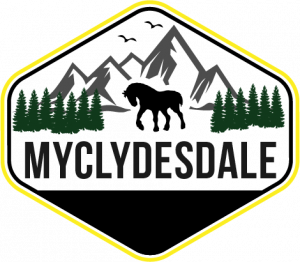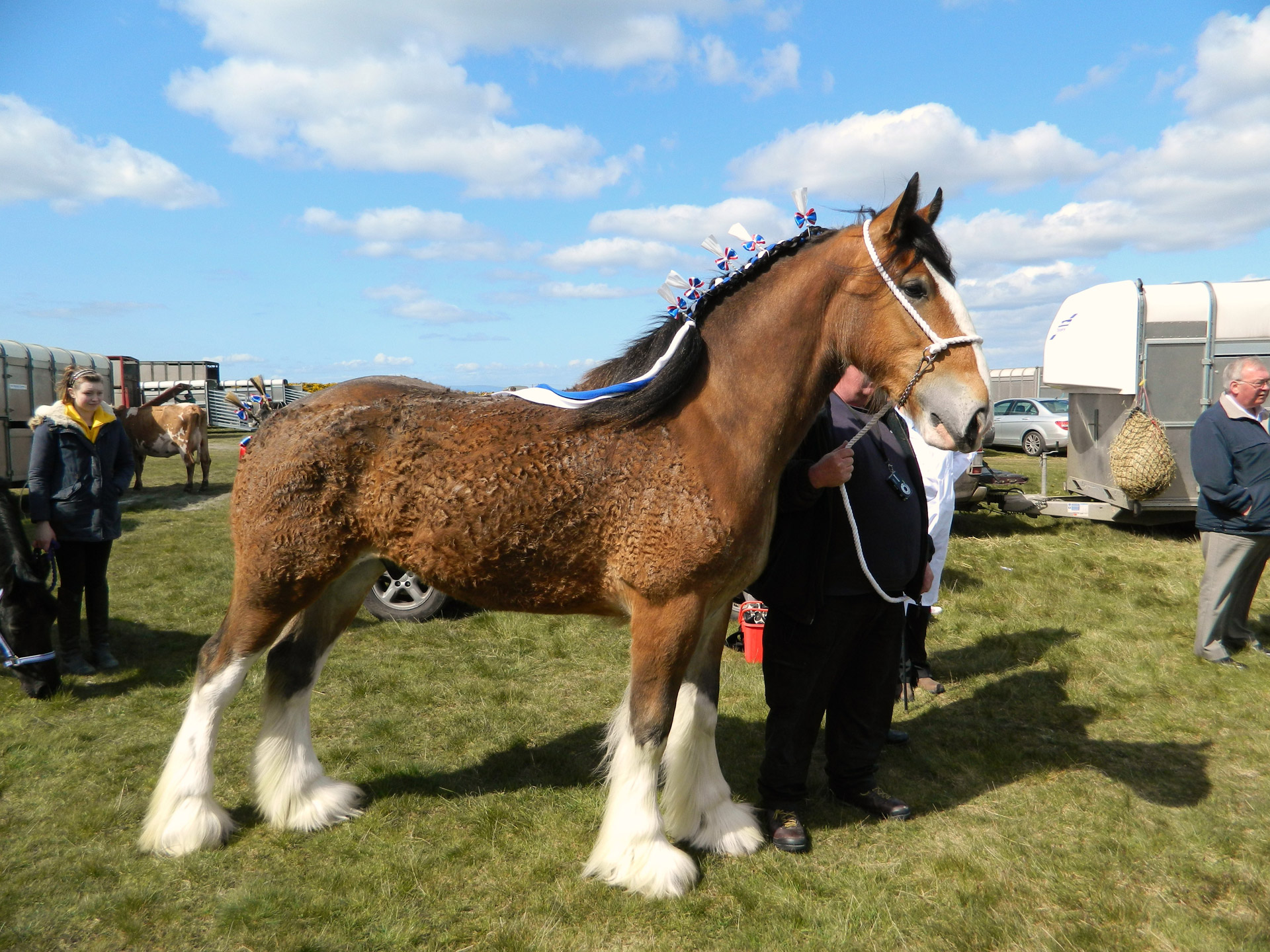Clydesdale is a very well known breed of horse. The Clydesdales were initially used for hauling coal, agriculture, and many other purposes. In today’s time, these Clydesdales are often used for driving, logging, and agriculture. If you have a Clydesdale or are planning to own one, you must read this article to get a deep insight into a Healthy Clydesdale and their eating habits.
Owning a Clydesdale
Many of you might be aware of Clydesdale’s, but for those who don’t know what Clydesdale’s are, then this section will surely help you in knowing Clydesdale’s better. Plus their is so much to learn about the benefits of owning a healthy Clydesdale.
One of the largest draft breeds, Clydesdale’s, are the heavy horses reaching about 6 feet high at the withers and capable of weighing about 2300 lbs or over. These gentle, intelligent, and cold blood horses truly shine when worked. The Clydesdales are the healthy, hardy horses capable of exceeding expectations for what a horse can handle, which is proven in their health record.
Clydesdales are often known to be the popular breed choice with carriage services and parade horses because of their feathery and white feet. Due to their calm disposition,That is why a healthy clydesdale will be essential. Clydesdales have proven to be comfortable to train and capable of making exceptional trail horses. So, if you plan to own a Clydesdale, you must be sure of owning a healthy one.
Further, in this article, readers will get to learn everything about Clydesdale horses eating and dietary habits, which involves the following: Kind of nutrition they need, Why they need a specific diet, What to feed them, and much more.
What Kind Of Nutrition Do Clydesdale Need?
Talking about the nutrients that Clydesdale needs, below are the six main classes of nutrients that Clydesdales require to survive, stay fit and healthy.
- Water
- Fats
- Carbohydrates
- Proteins
- Vitamins
- Mineral
All these nutrients must be included in Clydesdales’ diet in the specified amount to keep them strong and healthy.
Benefits of Owning a Healthy and Nutritious Horse
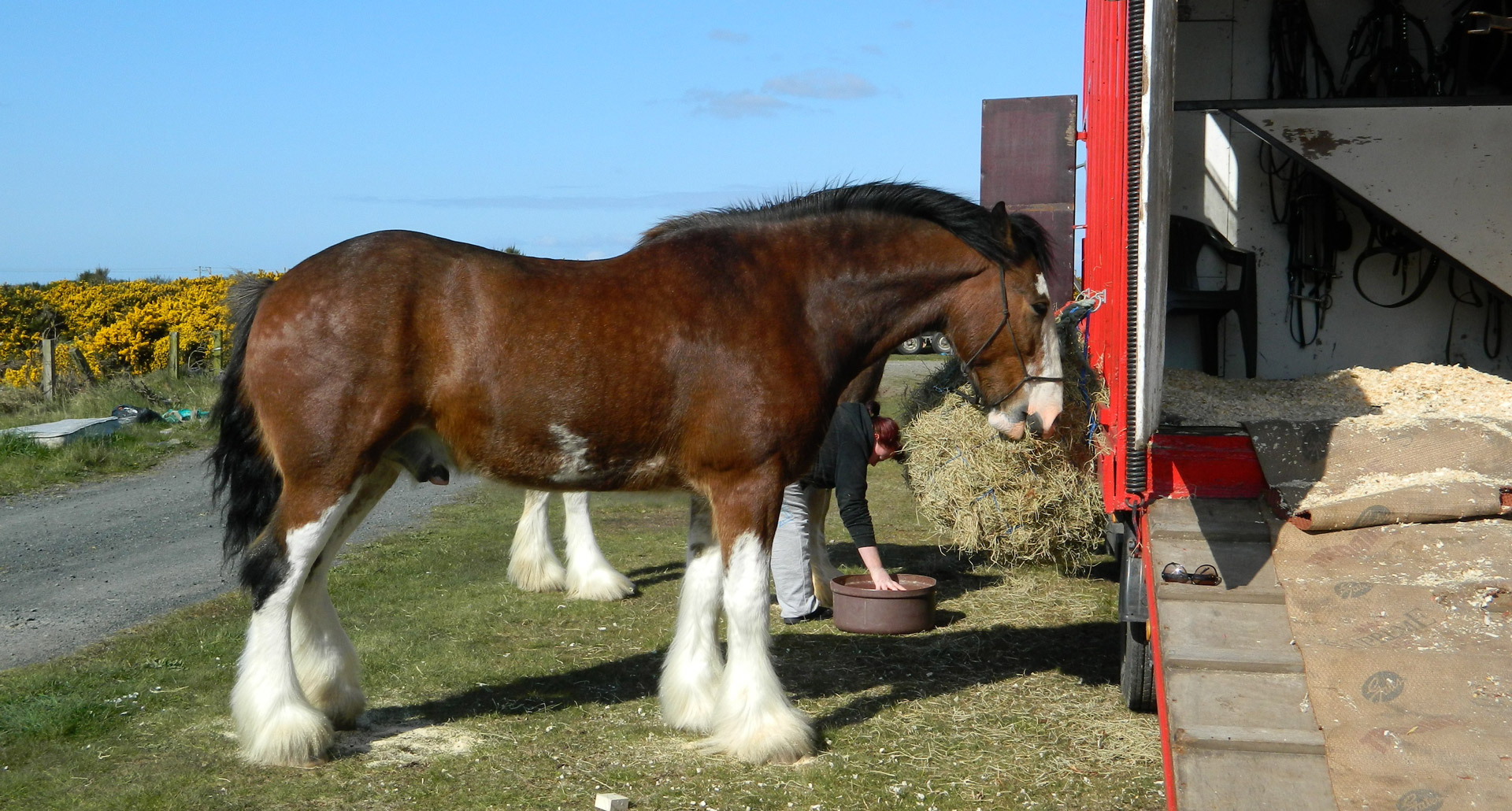
Clydesdales have become a favorite draft horse on ranches and farms of all types. They are commonly used for drafting purposes like logging, plowing, etc., but they excel at other types of draft work. Since the Clydesdales share two problems:
- Chronic progressive lymphedema and
- Polysaccharide storage myopathy
The first one is the disorder of the lymphatic system, which could eventually lead to death, and the later is the metabolic problem, which could cause tremors.
So, before owing a Clydesdale, you must keep one thing in mind that you should own a nutritious healthy Clydesdale so that it can offer you a variety of benefits which are as follows:
- They can be crossed with thoroughbreds to develop healthy level headed sport horses. – Thoroughbred cross
- They can be used for pulling agricultural implements and hauled logs in the forestry.
- They can be extremely good for your body and mental health
 .
. - They can be used as warhorses for carrying heavily armed soldiers.
- They can be used for performing general hauling tasks.
- They can be used in agricultural and logging work.
- They can be used as drum horses in the parades.
- They can be used as a valuable therapy horse.
- They make excellent trail horses.
What To Feed Your Clydesdale And Why?
In this section, you will learn how to properly craft Clydesdale’s diet to keep them fit and healthy. Providing a properly balanced and healthy diet is one of the essential parts of Clydesdale ownership. If you owe a Clydesdale, you must have a proper and basic understanding of how to feed them to ensure that your Clydesdale is on an acceptable nutritional level.
to keep them fit and healthy. Providing a properly balanced and healthy diet is one of the essential parts of Clydesdale ownership. If you owe a Clydesdale, you must have a proper and basic understanding of how to feed them to ensure that your Clydesdale is on an acceptable nutritional level.
Since Clydesdales have a particular dietary need, many of you might wonder Why Clydesdale Need A Specific Diet? We are here with an answer.
The Clydesdales have specific eating and dietary needs because they are herbivorous and have a unique digestive tract, which is quite different from humans. Clydesdales’ long digestive system requires a high and rich fiber diet that is to be consumed in small amounts over a longer span of time. We as human beings eat a few large meals, but if we talk about Clydesdales, they eat many small meals frequently. A healthy Clydesdale generally spends most of the time in eating. So, we have listed down some of the top things that must be included in Clydesdale’s dietary plan.
1. Water
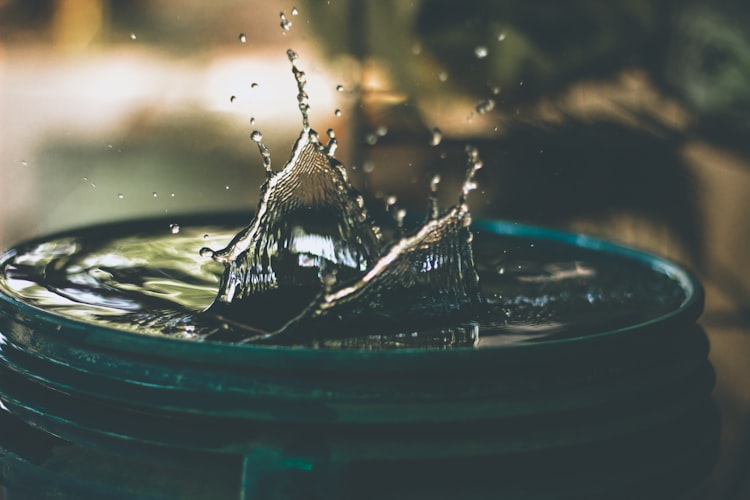
Water is the first and the basic necessity of Horses. Water is an essential part of the equine diet especially a healthy Clydesdale. A Clydesdale who eats pasture grass will not probably drink much water compared to the Clydesdale’s, who consume only the Hay diet. But fresh and clean water is essential for both of them in the required quantity.
If we talk about the amount of water Clydesdale’s drink, they drink and consume about 30 gallons or 114 l of water every day. And they are served with water every two hours.
Benefits:
- Reduce the risk of colic
- Help in maintaining body condition
- Assist in maintaining healthy digestion
- Better function of Circulatory and Digestive system
- Helps in fighting against diseases
2. Pasture Grass

Pasture grass and tender plants are the natural diet of the Clydesdale’s. They must be feed with a good quality of pasture to make them stay fit and healthy. Now you might have doubt that what a good quality of pasture contains? Here is an answer: A good quality of pasture grass contains most of the nutrients that a Clydesdale requires to be fit and healthy. It also includes some amount of silica which is suitable for their dental health. Good pasture grass provides natural grazing time, exercise, and the best nutrition to the Clydesdale’s that are hard workers.
Benefits:
- Lower rate of colic
- Decreased incidence of chronic obstructive pulmonary diseases
- Decreases the sign of arthritis in older Clydesdales
- Proper development of the skeleton of young Clydesdales
- Clydesdales will have fewer vices
Recommended Reading:
History of the Clydesdale Horse (All You Need To Know)
3. Hay
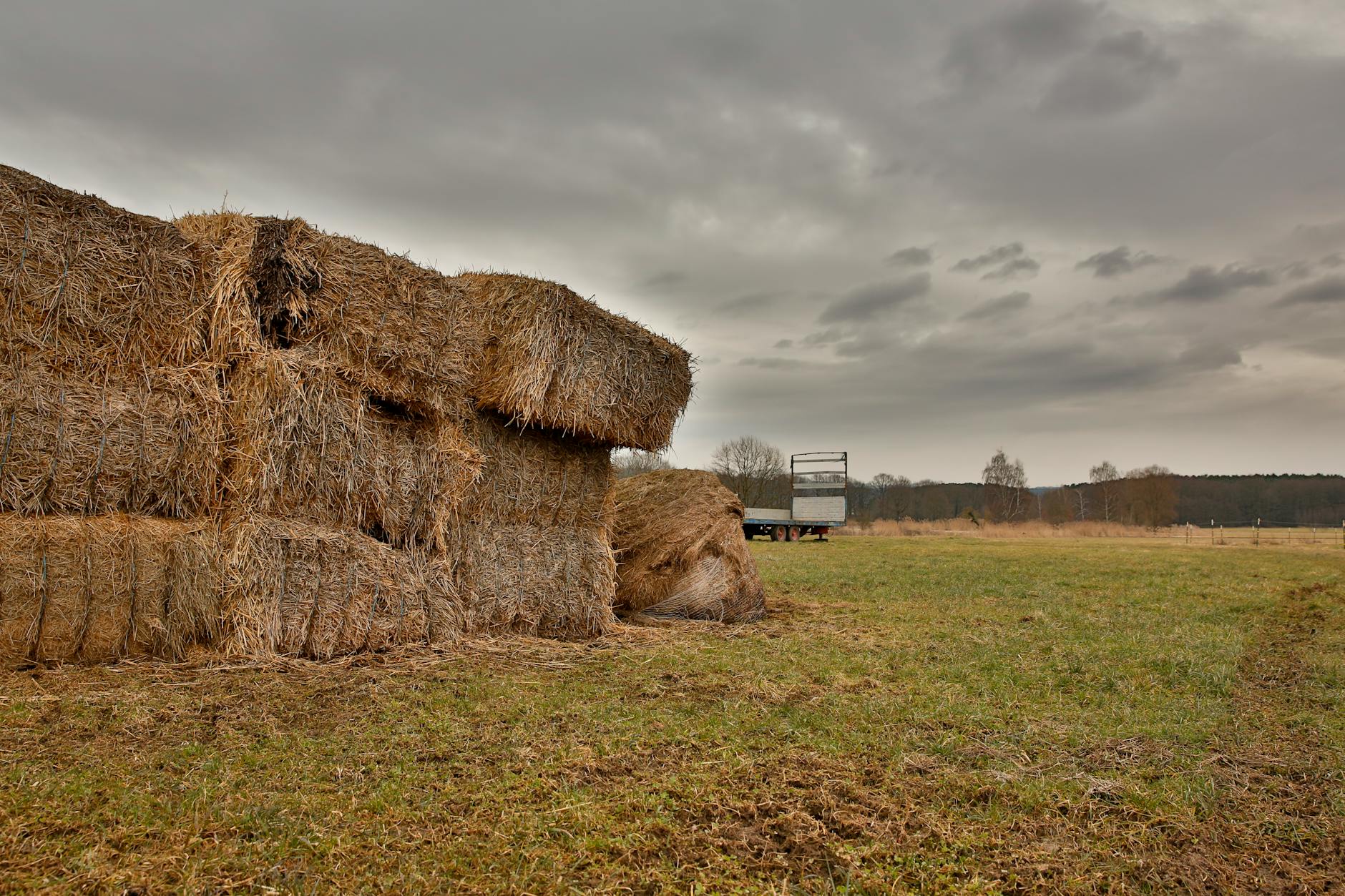
If you don’t have the luxury of letting the Clydesdales graze on pastures regularly, Hay is another best option to feed your Clydesdales with. The Clydesdales should consume Hay near about 1 to 2 percent of his body weight daily. If the Clydesdale is not on a good pasture diet, Hay is a vital part of their diet. Finding a good Hay for them might be challenging, but it will help to have Hay tested so that if there are any shortfalls in minerals and vitamins, then they can be easily compensated for with extra supplements.
Benefits:
- Satisfies the appetite of Clydesdales
- Provides necessary roughage without excess proteins and calories
- Meets the basic nutritional needs
- Allows us to keep Clydesdales in climatic conditions not natural for them
- Useful when keeping Clydesdales indoors or while transporting them
4. Concentrate Mixes
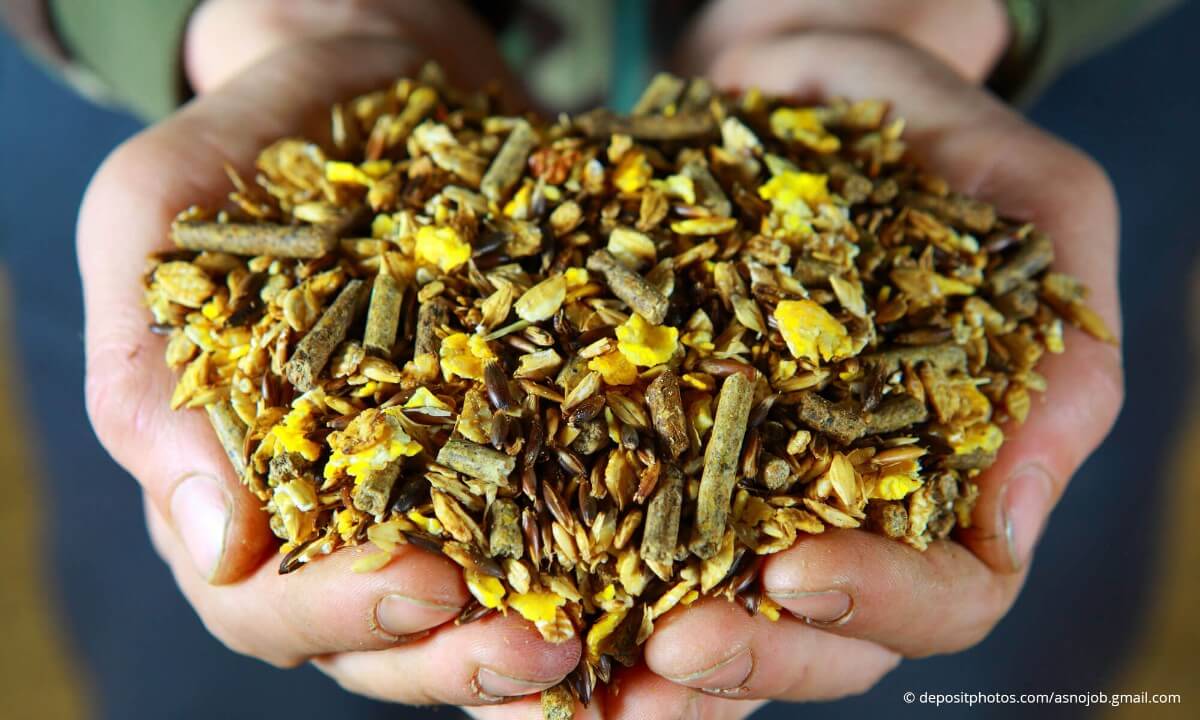
Another essential part of the Clydesdales diet is concentrate mixes . Concentrate mixes is usually a mixture of flaxseeds, grains, beet pulp, molasses for energy, bran, vitamins, flavor, and many other ingredients. Concentrate mixes can contain only one or several combinations of components designed to enhance the condition of horses, whether for weight gain, growth, or general overall health. Feeding your Clydesdales with these mixes will help make up for any shortfall in the nutritional diet and act as a quick energy source. The mares in foal, nursing mares, performance, or working horses often benefit from being fed concentrates when given in addition to grass or hay. These are so important to own a healthy Clydesdale.
. Concentrate mixes is usually a mixture of flaxseeds, grains, beet pulp, molasses for energy, bran, vitamins, flavor, and many other ingredients. Concentrate mixes can contain only one or several combinations of components designed to enhance the condition of horses, whether for weight gain, growth, or general overall health. Feeding your Clydesdales with these mixes will help make up for any shortfall in the nutritional diet and act as a quick energy source. The mares in foal, nursing mares, performance, or working horses often benefit from being fed concentrates when given in addition to grass or hay. These are so important to own a healthy Clydesdale.
Benefits:
- Good source of carbohydrates and vitamins
- Good feed for the Clydesdales who are underweight
- Helps in boosting energy
- Helps in proper growth
- Improves the life span of the Clydesdales
5. Grains

Oats, corn, barley are some of the common grain feed for Clydesdales. Not all grains are suitable for Clydesdales, which include wheat. Feeding the Clydesdales with grains is easy, as grains do not require much time for chewing. But one must keep in mind that a Clydesdales that over-eats a large amount of grain may cause colic. Oats, corn are an essential part of the Clydesdales diet, but corn must be included in their diet in small quantities only. Grains contain about 50% more energy than good quality of hay, making the grain an ideal feedstuff for Clydesdales.
Benefits:
- Grains are the source of starch
- Provides supplemental energy
- Rich source of nutrients
- Provides highest amount of proteins
- Rich source of fiber
6. Supplements

Finally, supplements like salt and minerals are also a vital part of your healthy Clydesdales diet. The supplements like minerals and salt can either be included in the concentrate mix or be given separately. Loose salt in a pasture or a salt block allows the Clydesdales to help themselves whenever they crave for something to eat. Some of the salt may come mixed with essential minerals. The minerals can be added in the concentrate mix meal of the Clydesdales.
like minerals and salt can either be included in the concentrate mix or be given separately. Loose salt in a pasture or a salt block allows the Clydesdales to help themselves whenever they crave for something to eat. Some of the salt may come mixed with essential minerals. The minerals can be added in the concentrate mix meal of the Clydesdales.
Free-choice salt, either trace mineralized or plain can also be offered to them but in the desired quantity divided between the meals which involve: at least 10 grams of salt per day for the Clydesdales that don’t work much and 20 grams of salt per day for the ones who work more.
Benefits:
- Important for fluid balance
- Useful for Hydration
- Increases the water intake capacity
- Manage muscle and nervous functions
- Rich source of minerals
Conclusions
This was all about Healthy Clydesdales and their dietary habits. It’ll help you to know the best things that will keep a Fit Healthy Clydesdale. But one must always keep in mind that all these items must be offered in limited and desired quantity only; otherwise, they may have ill effects on the Clydesdale’s health.
MORE INTERESTING POSTS TO READ
All You Need To Know About The Budweiser Clydesdale Farm
Top 15 Fascinating Facts About The Clydesdale Horse
Recent Posts
Mastering English Dressage: Tips and Techniques Complete Guide 101
Introduction English dressage is an equestrian sport that involves precise movements and commands between a dressage horse and its rider. It is a graceful, beautiful art form that requires skill...
Introduction Are you looking to learn more about western dressage, the art of horse dressage? If so, you've come to the right place. In the previous blog we looked at Western vs English Dressage,...
